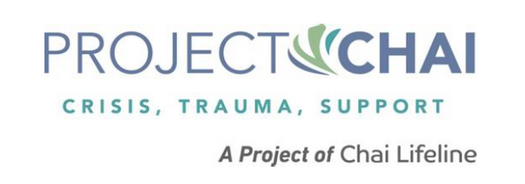
Project Chai Publishes A Conscientious Approach To Coronavirus Concerns
Rabbi Dr. Dovid Fox, Director of Project Chai, penned the following message to Jewish communities with a conscientious approach to coronavirus concerns.
FAMILIES FACING FEAR: A CONSCIENTIOUS APPROACH TO CORONAVIRUS CONCERNS
Our understanding of illness and disease, through the perspective of Torah, is that events which occur in life are not without cause or reason. The Torah does consign to humanity the right to engage in healing, and our hishtadlus – our personal steps to engage in the management of illness through seeking and through complying with professional expert help – is in no way a contradiction to our firm faith that HaShem is the only One who determines health, life and wellness.
Chazal also have instructed us that there are often conditions which circulate throughout the world, which include contagious and infectious diseases r’l, which we must regard as a “fact of life.” Although Divine hashgacha – a very personalized understanding that we accept that our entire life experience is determined by Him – is a Jew’s first level of contemplation when confronted with suffering and with challenge – we also know that there are times when we are not able to see a one-on-One mida-keneged-mida when we face some conditions. We cannot always fathom the purpose of a life-threatening or scary situation. There are many such times when we recall the words of Chazal that there are some health conditions which are not to be regarded as a punishment mida keneged mida at an individual level.
We also know that our Sages have instructed us in safeguards and measures which we must take in order to promote and maintain “shmiras ha’nefesh”, a concept which the Torah enunciates more than once to us. It is for that reason that Shulchan Aruch is replete with actions, risks and involvements which we must always avoid lest we become susceptible to harmful consequences.
The world is facing a new challenge. Daily news reports have alerted us to the onset of a virus emerging from the Far East which has created an emerging health crisis, and fears for the safety of individuals as well as countries. It is not our place to determine whether this is a ‘magefa’, a plague, or a punishment, or should be viewed from some other perspective. Some of our Torah leaders have observed that we need to focus on self-care right now in the form of spiritual shmira – avoiding misuse of our life-breath by avoiding idle gossip, refraining from speaking during davening and other preventative steps.
From the vantage point of mental health and management of crisis situations, it is important to consider ‘trauma inoculation’ or steps which each of us can take to prevent our anxiety and worry from turning into fear and panic. Panic is infectious and can ripple through our families and create an atmosphere of dread among our children. Prolonged worry and sadness can also wear down the body and the brain’s resistance to distress and even illness.
Consider these safety steps:
Accurate Information: It is important to gather facts from reliable expert sources. This means not jumping with every new report and not investing in rumor and sensationalization. Seek out updates, but not to the degree of obsessive and constant preoccupation with the world news, and determine whether there are credible reasons for you and your family to take precautions, or to be more alert and aware, but without becoming hyper-vigilant.
Communicate: speak with your children about their worries. Share factual information so that they have a perspective which is accurate, recognizing that rumor control is damage control, and that anxiety runs out of control when children lack accurate information. Reassure your children. Listen to their concerns. Offer perspective and do not ridicule them for being afraid. Rather, validate the source of their worries and support them past their fear. Encouragement, support and reassurance are powerful tools.
Clinical Sensitivity: When children and even adults learn of a health risk, it is often easy to develop sympathetic symptoms. A common cold, a cough, an ache or nausea can all lead a young person to fear that they have “caught it”, and often they will catastrophize that what might be a minor ailment is actually a morbid diagnosis. Recognize that anxiety does often lead to both exaggerated body sensations, and to an exaggerated interpretation of what the symptom represents. Check with your family doctor as needed, but support your child in understanding that being down with a cold or sick with the flu does not mean that they have contracted a deadly virus or infection. Be patient, be sensitive, and encourage your child that they will be all right, and when needed, they can arrange an appointment with the family physician. Hygiene: During the Middle Ages, much of Europe was stricken with “the Black Death”, or bubonic plague, and millions died. Jews generally did not die, and this led to anti-Semitic superstition that Jews had used magic or treachery to poison others. In historical fact, it is likely that Jewish use of Mikva and of hand washing were the major reasons, beyond that of Divine Will, that Jews were not infected. Currently, it is very important that we introduce and reinforce cleanliness and hygiene in and out of our homes, at school, and at work. We must emphasize to families the vital role of hand washing, bathing, use of soap, laundered clothes, washed dishes. This should not become a compulsive ritual, which in itself will generate more anxiety in people. Rather, a conscientious discussion about committing to keeping and staying clean is a wise and prudent step at this time.
Faith: As with any stress or fear besetting us, this is a time for focused tefilla. Join with your children in praying for this virus to be resolved. Pray for the safety and welfare of your family and friends, and for the Jewish community worldwide. Discuss faith within the family, learn with your children, bring HaShem into your daily discussions, and make it possible for each child and for yourselves to feel that we turn to Him at all times, including times of doubt and uncertainty. Another dimension of concern, beyond that of our children and our families, is the status of our schools. Already, in a number of communities in this country and abroad, schools have closed in reaction to reports that a member of the local community affiliated with the school or yeshiva, may have contracted the Coronavirus. This takes an immediate toll on families, on classes and on the continuity of Torah study and broad education. It also restricts the mobility and activity forms and levels of the student body and their faculties. When a family has been ordered into quarantine, the uneasiness among those close to that family and those who have had contact with a stricken individual, will abound, and can skyrocket. It has been many decades since people have had to contend with concepts such as medical isolation, quarantine, shortage of diagnostic tests, and lack of useful medicines. This can lead to great worry, to anxious thoughts and fears, and ultimately to a lowering of mood energy. The very fact that a child might be restricted as to going out of doors and being able to run and to exercise can create a depressed outlook and feelings of sadness and irritability. Those families who are ordered into quarantine must discuss with the family doctors the forms of activity and the range of things which can be undertaken in order to maintain mood energy, and in order to avoid medical complications in the event of having respiratory or other symptoms.
There are going to be some lifestyle changes, hopefully temporary ones, in the event that your local school is not in session. For parents who work, there will be concerns about supervision of children who stay home. Some will want to procure tutors, rebbeim, and other educators who can continue the learning and education of their children. Some will want to explore alternative means of helping their children remain in contact with their peers, in that social support and connecting with friends is an essential feature of mental hygiene. As always, working with the guidelines set by your family doctor as to health and hygiene is essential. Consulting with staff at Chai Lifeline and Project Chai is another avenue for addressing your worries, your child’s fears and moods, and for constructing routines and practices which will encourage the mentally hygienic adaptation of your children and your students during what might become a tenuous time.
There may be circumstances wherein a parent is under observation and is ordered to cease direct contact with his or her spouse and children. This will require discussion, processing and attentiveness to the feelings of isolation, abandonment and rejection which can afflict a confused child who is not able to go near or be close to a beloved parent. It is important to consult with a specialist who is familiar with illness and its impact on the family. Here too, the staff at Chai Lifeline and Project Chai will be available to provide conference calls and material support, drawing from our decades of working with these very issues and
circumstances. Absence from work, when ill or under quarantine, can mean reduced income, which leads to additional worries and pragmatic limitations on home life. Although at this moment, few people are dealing with that particular set of realistic stresses, it might be useful for adults to examine their options in the event of such a predicament. It is recommended that such information not be discussed loosely with or around children, in that economic concerns are beyond the scope of young children and can create needless confusion and fear. In adjusting to changes in reality and in lifestyle, it is natural for children and for adults to be uneasy, to be nervous, to be a bit irritable and to feel stressed. Short term reactions of those sort are normal, and should be acknowledged, validated and then dealt with through reassurance and encouragement, as has been mentioned above. Monitor your child. In the event that nervousness turns to phobia, or to panic, or to withdrawal and diminished functioning, to obsessional thinking, to compulsive behavior, to disturbed eating and sleeping patterns, or to aggressive acting out, consider a phone consultation with our department’s crisis team for guidance and for support. Most children do not and will not manifest severe signs of distress. You can promote a calm atmosphere for your child when you do your best to keep all of the regular home and family routines, to maintain schedules of eating time, sleeping time, study time, prayer time, and to provide your children with productive activity with which to structure their day and evening.
As parents and teachers, you set the pace for your children, as their source of sane thinking, as their model of faith and religious devotion, and as their example of how we face fear and uncertainty. Embrace that role. Enjoy this task. A healthy home and a stable, cohesive family are among our finest remedies for insulating ourselves from the threats which surround us. May HaShem grant us a rapid solution for the current worry.
Rabbi Dr. Dovid Fox
Director of Interventions and Community Education, Project Chai
We invite you to contact us if you have any questions or need further
suggestions or guidance:
Crisis@chailifeline.org
855-3-CRISIS
[pdf-embedder url=”https://crownheights.info/assets/2020/03/Project-Chai-Coronavirus.pdf” title=”Project Chai Coronavirus”]















